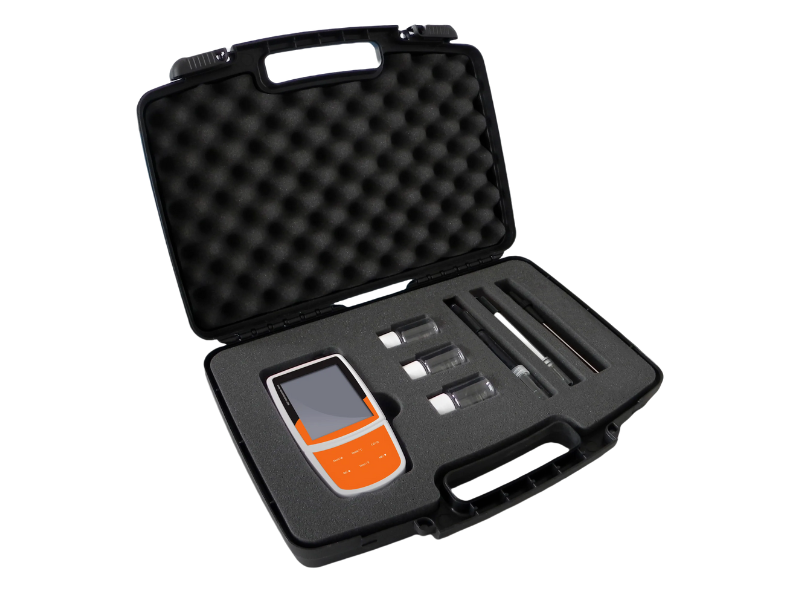How to Evaluate a Multiparameter Water Quality Analyzer Factory?
Evaluating with suppliers, and vendors like multiparameter quality analyzers one that is optimal is critical especially for companies, laboratories, and environmental monitoring organizations as there is extensive dependence on the precision of the water quality testing data. Water Quality Analyzer factories of higher quality are more than just the performance and durability of water quality testing instruments. They also build lasting support and value over time. With the plethora of Water Quality Analyzer suppliers, identifying the right partner is no challenges. This essay unpacks the fundamentals with the most important to be taken into consideration about water quality analyzers and their factories.

Industry Experience and Industry Expertise
When trying to determine the usefulness of a factory, industry experience and expertise must come first. This especially goes for the water quality testing equipment industry. In this industry, it is the most crucial to have technical know cómo. This industry is dominated by mastering experience in multiparameter analyzers core technologies. It is common that factories with more exposure to the industry have a more profound understanding of customer needs in varied scenarios and the gaps in the products in the market. This understanding results in product refinements and their products in the market have gone through iterative cycles.
Investigate older factories instead of ones that just opened. Such facilities have been able to survive turbulent markets and technological advancement, which shows that they can adapt and evolve. For instance, factories that have been crafting water quality detectors for 40 years can be assumed to have refined their processes and quality control, and their know-how is probably extensive on the various key parameters that multiparameter analyzers should accurately measure, which include COD, ammonia nitrogen, total phosphorus, total nitrogen, BOD, SS, chromaticity, and various heavy metals.
In addition, find out whether the factory is involved in specialized research and development of water quality testing. Such factories are more likely to focus their resources on technological improvements instead of dividing their attention to several different product categories. This focus leads to more dependable and more advanced multiparameter analyzers that are more compatible with the changing requirements of the water quality testing industry.
Product Quality and Technical Capabilities
The quality of that product is the heart and soul of the evaluation, and multiparameter water quality analyzers are no different. This category of equipment must be able to provide accurate and consistent results under various stability and environmental conditions, and as a result, their technical capabilities and build quality are non negotiable.
Let’s take a look at some features you can look at when buying a multi parameter analyzer. The best units will have the ability to cover a variety of testing needs. This means models should have more than 40 indicators and more than 90 modes. The best models will have high quality hardware. Some things to look out for are high definition touch screens. 7 inch displays at resolutions of 1024*600 are high quality and work well. Built in printers ensure that you can document results at the measurement site, and 360 degree rotation will ensure that you get the best color comparison. If you are buying a portable multi parameter analyzer you should look for compact but durable models to withstand field use. However, if you are buying one for a lab then it will need to have high levels of accuracy and the ability to do multiple test at once.
The measurement technology should also be taken into consideration. Reputable manufacturers are likely to take measurement technology and accuracy seriously. This means the have the ability to high end technologies to spectrophotometry, and electrode technology. For water testing, these technologies can be turbidity meters that use a 90 degree scattering method to get better results. Given the high level information of multiple technologies, these devices should be able to be calibrated in order to preserve the accuracy of the device over time. This is especially the case for devices that will be used over long periods of time.
Be sure to assess the quality of consumables and accessories that come with the analyzers. Quality companies will have dominantly refinished precast reagents, test strips, glassware, and filters that fit with their instruments. These consumables need to be precise, reliable, and easy to use, as they affect the efficiency and results of the test. For instance, COD precast reagents with well-defined measurement ranges and steady performance will save time and minimize errors during testing.
Production Capacity and Scale
A factory’s production capacity and scale tell you their ability to accept and complete large orders while keeping consistent quality and timely delivery. When assessing a factory, look at their base production size, number of production lines, and their quality control.
A production base of more than 10,000 square meters is a good sign for the scale of their operation and is esp a good sign for the potential of them to have standardised production and an efficient production workflow. These factories are more likely to have good quality production control of their equipment and systems to ensure high standards are met for each instrument. Large factories will have less issues with supply chain management, less delivery delays, and fewer shortages of consumables.
When considering production capabilities, one salient feature to keep in mind is quality control. A reputable factory will maintain stringent quality control checks throughout the production process, from the initial stages of raw material selection to testing the finished product. Additionally, such factories may have certifications such as CE, indicating adherence to certain quality and safety standards on an international scale. All such certifications are clear indicators of the factory's commitment to quality, as well as their ability to cater to global market demands.
Customer service and support
When doing business with a multiparameter water quality analyzer factory, reliable customer service and support are essential. Water testing equipment purchased may need installation instructions as well as subsequent calibration, maintenance, and troubleshooting. Quick and efficient customer support is important as it can save a lot of time and resources.
When assessing a factory's service offerings, do they have a dedicated service hotline, email support, or online consultation? A nationwide or international service network is an added advantage, particularly for businesses with a geographical presence in multiple regions. For instance, factories which have a 24/7 service hotline or localized service centers can respond to urgent matters and crises promptly.
Training and technical documentation are also essential. Factories must give their users detailed operation manuals and training videos, and provide personnel training on site if required, so that consumers can learn how to use the instruments quickly. Also, the factory should provide after sales maintenance service, and if possible, have a warranty policy. If the warranty period is reasonable (1 year or more), it indicates that the factory is confident in the quality of their products.
Another thing to think about is the availability of consumables and spare parts. Factories should be able to provide replacement parts and consumables without delay, so that there are no interruptions in your testing work. Factories that provide long term supply agreements for consumables are able to ensure consistency and lessen the headache of sourcing from multiple suppliers.
Market Reputation and Customer Base
A factory’s market reputation, and customer base, are strong indicators of the reliability and quality of their products. Well established and reputable factories tend to have large and diverse customer bases, including notable names and companies, research institutes, and public administration.
When looking for factories, potential buyers should check for customer reviews, testimonials, and case studies documented in the factory’s website, or, even better, in a third party site, in order to avoid bias. If the factory has collaborative links within the food and beverage, pharmaceuticals, chemicals, and municipal wastewater Treatment s, it tends to position its offerings to the quality levels appropriate for those sectors. For instance, associations with big Multinationals such as P&G, Unilever, and Coca Cola or with research, the factory is able to garner collaborations with prestigious Universities like the University of Sydney.
Experience with exports also counts. Factories whose plant products are exported to more than 90 countries are likely to have attained quality and regulatory requirements of the different jurisdictions. This would ascertain their capability to manufacture instruments whose requirements are deemed to comply with standards of the global regulatory framework. This would be the case for a business that operates in a global market or an entity that requires instruments with specific international certifications.
Innovation and Technological Advancements.
Water Quality Testing is a fast-paced industry. New equipment, new tests, and new technologies are developed regularly. Factories that place a priority on innovation and technological advancement are better positioned to offer products that are responsive to industry needs and trends.
See if the factory spends money on research and development (R&D) and has a history of making technological improvements. For instance, factories that have moved from single chip microcomputer based instruments to Android operating systems focus on improving user experience and functionality. New features like wireless data transmission and compatibility with laboratory information management systems (LIMS) and automated data loggers are great for improving the efficiency of testing.
Moreover, consider factories that are active in developing industry standards and have some of their patents. This illustrates the factory's technical leadership and ability to spearhead advancements in the industry. For instance, factories that have patents for novel measurement techniques or instrument designs are more likely to have their products with distinct market advantages.
Certification and Compliance with Industry Standards
Certification and compliance with industry standards and regulations is a prerequisite for multiparameter water quality analyzers because of their importance in environmental monitoring and compliance with legislation. When assessing a factory, ensure that its products conform to the relevant standards of the country and the international community.
Look for CE, ISO, and local certifications like EPA and GB as these are vital for ascertaining if the instruments are certified for precision, safety, and being eco-friendly. For instance, CE certification means the product has met the requirements of safety and environmental protection, and it can be sold in the European Union market.
The factory should also be complying with having GMP certificates as well as having Quality Management System. This ensures that the making of the instruments is done in a streamlined manner and that every single one is tested thoroughly before being sold to the market. Factories that are certified as "high tech enterprises" or "specialized and sophisticated small giant enterprises" are also likely to meet the requirements of being compliant in the industry.
Conclusion
Evaluating a multiparameter water quality analyzer factory should focus on a combination of industry experience, quality of their products, production capacity, customer service, market reputation, and also innovation among other things. This way, you can ensure that you receive quality instruments, good service, and long-lasting benefits.
When choosing manufacturers for water quality testing instruments, a well-established factory with a history in the field likely possesses a better-developed product portfolio and a more profound understanding of the market. Factors such as measuring range and accuracy, features, and compatibility with various consumables should be collected prior to engaging with your factory of choice. Such a factory, with more available resources, a better-managed quality system, and a more reputable market position, will provide better market offers in a more consistent and reliable manner.
Lastly, customer support and innovative systems should not be overlooked. Such a factory, supporting their products with available training, consumables, and after-sales support should help you obtain the best returns for your investment. Choosing a factory with a track record of innovative systems will provide varying levels of functionality, in accordance with the market's evolving demands. These factors should guide you in your choice, to provide you with accurate and dependable results in your water quality testing requirements.

